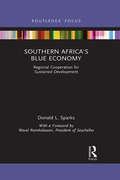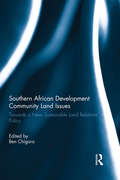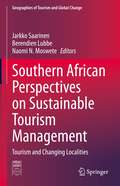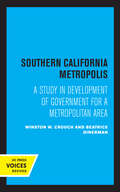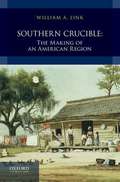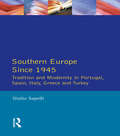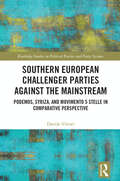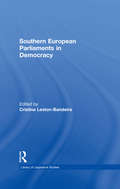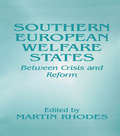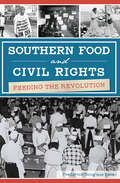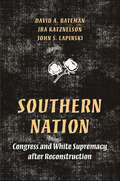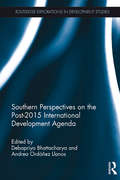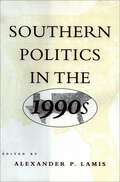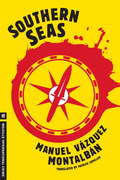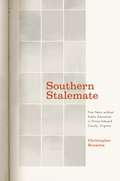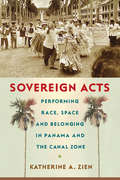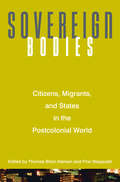- Table View
- List View
Southern Africa's Blue Economy: Regional Cooperation for Sustained Development (Europa Introduction to...)
by Donald L. SparksSouthern Africa’s maritime interests are considerable: its oceans and ports are essential to the wealth of the region, are crucial for trade and are an important source of employment, food and energy. However, regional governments do not place sufficient attention on the Blue Economy and its potential to stimulate economic growth. Of the 17 UN Sustainable Development Goals, goal Number 14 (Life Below Water) is the least funded. Less than 1% of Official Development Assistance goes toward this goal, and even private investment and funding from philanthropic organizations is grossly inadequate to meet Africa’s blue economy needs. It is vital for the international community to face up to the challenges of Africa’s Blue Economy and start working on solutions and for southern Africa’s Blue Economy policies and goals to be expanded. Just as sustainable development green initiatives show promise, so too could Blue Economy projects and activities. Southern Africa’s rich coastal and marine resources need to be managed on both a national and regional level if they are to be used in a long-term, sustainable way. This book provides, for the first time, a concise study of the constraints and opportunities that the Blue Economy offers for southern Africa and the role that the Southern African Development Community (SADC) could play in fostering a sustainable use of its ocean and coastal resources.
Southern African Development Community Land Issues: Towards a New Sustainable Land Relations Policy
by Ben ChigaraThis book constitutes volume one of a two volume examination of development community land issues in Southern Africa. In this volume, Ben Chigara undertakes a holistic inter-disciplinary evaluation of the legitimacy of colonial and emergent post-colonial rule property rights in affected States of the Southern African Development Community (SADC). It particularly focuses on intensifying litigation in national courts, the SADC Tribunal, and more recently the Washington based International Centre for the Settlement of Investment Disputes (ICSID) regarding counter claims to title to property. The book examines cultural, economic and political drivers at the core of SADC land issues, focusing on their significance and potential to contribute to the discovery of a new, sustainable land relations policy that guarantees social justice in the distribution of all the advantages and disadvantages relating to the allocation and use of land. Chigara shows that persistent systematic administrative failures by pre-colonial, colonial and post-colonial authorities have made for a very complex challenge that requires Solomonic tools that neither the Courts alone, nor human rights centric morality alone could resolutely attend. The book recommends a sophisticated systematic new approach to SADC land issues, which is developed in volume two, Re-conceiving Property Rights in the New Millennium. This book will be of great interest to students and researchers of Property and Conveyancing Law, Human Rights Law and Land Law.
Southern African Perspectives on Sustainable Tourism Management: Tourism and Changing Localities (Geographies of Tourism and Global Change)
by Jarkko Saarinen Berendien Lubbe Naomi N. MosweteThis edited collection focuses on tourism development, sustainability and local change in southern Africa. The book offers a range of both conceptual and applied perspectives that address various changes in southern African tourism and community development relations. The key drivers of change that include climate change and globalization form the context for the diverse and interesting set of case studies from the region. The main conceptual grounds of the book cover sustainability, sustainable development goals (SDGs), responsibility, vulnerability, adaptation, resilience, governance, local development and inclusive growth. In this book sustainability is seen as one of the most important issues currently facing the tourism sector, affecting all types and scales of tourism operations and environments in the region. Tourism is an increasingly important economy in the southern African region and the industry is creating changes for communities and environment while also facing major challenges caused by global trends and changes. The book offers a case study driven approach to sustainability needs of tourism development in local community contexts. The case study chapters are linked through the book’s focus on sustainable tourism and local community development. Through emphasizing the need to understand both global change and local contexts in sustainable tourism development, this book is a valuable resource for all those working in the field.
Southern California Metropolis: A Study in Development of Government for a Metropolitan Area
by Winston W. Crouch Beatrice DinermanThe concept of the metropolitan area, as best exemplified by Los Angeles, has highlighted two contradictory characteristics of the current urban scene: the dispersion of political power among a number of centers, and the presence of issues and problems whose impact transcends the jurisdiction of any one local government. In this book the author have focused their attention of the process by which organized groups have sought to identify public issues and to reach decision on them within one of the most rapidly developing and most complex metropolitan areas of the United States: Los Angeles. Beginning with a discussion of the setting and framework of the Los Angeles metropolitan area, the authors attempt to clarify the nature of the legal, political, social, and economic forces tha have shaped the present system. The second part of this work is concerned with the contenders for leadership within the area: the central city, the urban county, and the suburbs. On the basis of the collected information, the authors next pose the hypothesis that democratic ideology and group interests have combined to produce competing power centers from which groups operate while at the same time lacking sufficient resources to dominate decision making. In the final section of a number of possible alternatives that might produce decision on area-wide issues are examined, and suggestions for bringing together the various political groupings are given. Research for this work was carried out under a grant from the John Randolph Haynes and Dora Haynes Foundation. This title is part of UC Press's Voices Revived program, which commemorates University of California Press's mission to seek out and cultivate the brightest minds and give them voice, reach, and impact. Drawing on a backlist dating to 1893, Voices Revived makes high-quality, peer-reviewed scholarship accessible once again using print-on-demand technology. This title was originally published in 1963.
Southern Capitalism: The Political Economy of North Carolina, 1880-1980
by Phillip J. WoodSouthern Capitalism challenges prevailing views of Southern development by arguing that the persisting peculiarities of the Southern economy-such as low wages and high poverty rates-have not resulted from barriers to capitalist development, nor from the lingering influence of planter values. Wood argues that these peculiarities can instead be best understood as the consequence of a strategy of capitalist development, based on the creation and preservation of social conditions and relations conducive to the above-average exploitation of labor by capital. focusing on the evolving relationship between capital and labor as the core of this strategy, Wood follows the process of capitalist industrialization in North Carolina from its beginnings in the aftermath of the Civil War to the 1980s.
Southern Crucible: The Making Of An American Region
by William A. LinkSouthern Crucible: The Making of an American Region seeks to fashion a new narrative about the American South. Informed by the most current scholarship in the field, the book offers a balanced look at the region's social, political, cultural, and economic history over four centuries, from pre-contact to the present. Focusing on several major themes in southern history--including the role of racial hierarchy, the role of women and gender, and the impact of immigration--author William A. Link presents the area's distinct history while carefully highlighting its remarkable diversity and geographic, cultural, and economic differences. Fast-paced and engaging, Southern Crucible challenges students to reexamine the region's history and culture and discover the legacy that the South has had on the entire nation's history.
Southern Crucible: The Making of the American South, Volume 2
by William LinkSouthern Crucible: The Making of an American Region seeks to fashion a new narrative about the American South. Informed by the most current scholarship in the field, the book offers a balanced look at the region's social, political, cultural, and economic history over four centuries, from pre-contact to the present. Focusing on several major themes in southern history--including the role of racial hierarchy, the role of women and gender, and the impact of immigration--author William A. Link presents the area's distinct history while carefully highlighting its remarkable diversity and geographic, cultural, and economic differences. Fast-paced and engaging, Southern Crucible challenges students to reexamine the region's history and culture and discover the legacy that the South has had on the entire nation's history.
Southern Cultures: The Politics Issue
by Harry L. Watson Jocelyn NealIn the Fall 2012 issue of Southern Cultures...Guest Editor Ferrel Guillory's special election-year Politics issue features:Five Big Things You Need to Know About the South for this ElectionThe Past, Present, and Future of Southern PoliticsJack Bass on Citizens United, Strom Thurmond, the Southern Strategy, and Jackie OControl of Public Schools and the Politics of DesegregationThe South in the Shadow of NazismDocumenting the Political Immigrant Debate Today Bill Clinton on . . . Bill Clinton. . . and more.Southern Cultures is published quarterly (spring, summer, fall, winter) by the University of North Carolina Press. The journal is sponsored by the University of North Carolina at Chapel Hill's Center for the Study of the American South.
Southern Europe: Politics, Society and Economics Since 1945
by Giulio SapelliUntil relatively recently most of southern Europe was governed by authoritarian dictatorships, but within the space of two decades more or less stable democracies have become established throughout the entire region. At the same time, backward peasant economies have been transformed by the injection of huge amounts of capital and new technology, into modern economies which are now approaching the size of the more established economies of Northern Europe.Southern Europe is a major contribution to our understanding of European politics. The product of original research and synthesis on exceptionally wide literature, it provides authoritative and systematic coverage of the politics, economics and society of this important region of Europe from 1945, up to the 1994 election of Silvio Berlusconi's far right alliance in Italy.
Southern European Challenger Parties against the Mainstream: Podemos, SYRIZA, and MoVimento 5 Stelle in Comparative Perspective (Routledge Studies on Political Parties and Party Systems)
by Davide VittoriThis book focuses on the rise of new challenger parties and the magnitude of their impact on political systems and the existing political order in Southern Europe in the aftermath of the Great Recession. Examining Podemos (Spain), SYRIZA (Greece), and M5S (Italy), it highlights the differences and commonalities between them and their voters. The book reveals whether these parties were effectively able to change the status quo represented by mainstream parties and, secondly, whether they created novel organizational structures capable of “bring the people in”, that is, of re-mobilizing disenfranchised voters and of re-inventing the concept of participation within the political party. This book will be of key interest to scholars and students of party politics, representation, leadership, political elites, public opinion, populism, and more broadly to comparative politics, European studies, and contemporary European history.
Southern European Parliaments in Democracy (Library of Legislative Studies)
by Cristina Leston-BandeiraSouthern European Parliaments in Democracy analyses the development of the parliaments of Greece, Italy, Portugal, Spain and Turkey since the mid-1980s. This book considers the challenges of the transition to democracy and outlines how the Parliaments of Southern Europe have adapted to the pressures of a democratic polity. Its focus is an assessment of the main changes that have taken place since the periods of transition to democracy right up to the present day. Chapters are country specific and consider a variety of indicators, from legislation and scrutiny to the social background of MPs. This book was previously published as a special issue of the Journal of Legislative Studies.
Southern European Welfare States: Between Crisis and Reform
by Martin RhodesSouthern European welfare states - in common with their northern counterparts - are under stress. They have become the object of studies exploring the southern "type" or "model" of welfare. This collection provides a series of both comparative and specific country analyses.
Southern Food and Civil Rights: Feeding the Revolution (American Palate Ser.)
by Frederick Douglass OpieFood has been and continues to be an essential part of any movement for progressive change. From home cooks and professional chefs to local eateries and bakeries, food has helped activists continue marching for change for generations. Paschal's restaurant in Atlanta provided safety and comfort food for civil rights leaders. Elijah Muhammad and the Nation of Islam operated their own farms, dairies and bakeries in the 1960s. "The Sandwich Brigade" organized efforts to feed the thousands at the March on Washington. Author Fred Opie details the ways southern food nourished the fight for freedom, along with cherished recipes associated with the era.
Southern Gaul and the Mediterranean
by Alex MullenThe interactions of the Celtic-speaking communities of Southern Gaul with the Mediterranean world have intrigued commentators since antiquity. This book combines sociolinguistics and archaeology to bring to life the multilingualism and multiple identities of the region from the foundation of the Greek colony of Massalia in 600 BC to the final phases of Roman Imperial power. It builds on the interest generated by the application of modern bilingualism theory to ancient evidence by modelling language contact and community dynamics and adopting an innovative interdisciplinary approach. This produces insights into the entanglements and evolving configurations of a dynamic zone of cultural contact. Key foci of contact-induced change are exposed and new interpretations of cultural phenomena highlight complex origins and influences from the entire Mediterranean koine. Southern Gaul reveals itself to be fertile ground for considering the major themes of multilingualism, ethnolinguistic vitality, multiple identities, colonialism and Mediterraneanization.
Southern Labor and Black Civil Rights: Organizing Memphis Workers (Working Class in American History)
by Michael K. HoneyWidely praised upon publication and now considered a classic study, Southern Labor and Black Civil Rights chronicles the southern industrial union movement from the Great Depression to the Cold War, a history that created the context for the sanitation workers' strike that brought Dr. Martin Luther King, Jr. to Memphis in April 1968. Michael K. Honey documents the dramatic labor battles and sometimes heroic activities of workers and organizers that helped to set the stage for segregation's demise. Winner of the Charles S. Sydnor Award, given by the Southern Historical Association, 1994. Winner of the James A. Rawley Prize given by the Organization of American Historians, 1994. Winner of the Herbert G. Gutman Award for an outstanding book in American social history.
Southern Man: A Novel (Penn Cage #7)
by Greg IlesAn instant New York Times bestseller!“Greg Iles is one of America’s great storytellers." –Stephen King, #1 New York Times bestselling author"A first-rate political thriller."–John Grisham, #1 New York Times bestselling authorThe hugely anticipated new Penn Cage novel from the #1 New York Times bestselling author of the Natchez Burning trilogy and Cemetery Road, about a man—and a town—rocked by anarchy and tragedy, but unbowed in the fight to save those they loveFifteen years after the events of the Natchez Burning trilogy, Penn Cage is alone. Nearly all his loved ones are dead, his old allies gone, and he carries a mortal secret that separates him from the world. But Penn’s exile comes to an end when a brawl at a Mississippi rap festival triggers a bloody mass shooting—one that nearly takes the life of his daughter Annie.As the stunned cities of Natchez and Bienville reel, antebellum plantation homes continue to burn and the deadly attacks are claimed by a Black radical group as historic acts of justice. Panic sweeps through the tourist communities, driving them inexorably toward a race war.But what might have been only a regional sideshow of the 2024 Presidential election explodes into national prominence, thanks to the stunning ascent of Robert E. Lee White, a Southern war hero who seizes the public imagination as a third-party candidate. Dubbed “the Tik-Tok Man,” and funded by an eccentric Mississippi billionaire, Bobby White rides the glory of his Special Forces record to an unprecedented run at the White House—one unseen since the campaign of H. Ross Perot.To triumph over the national party machines, Bobby evolves a plan of unimaginable daring. One fateful autumn weekend, with White set to declare his candidacy in all fifty states, the forces polarizing America line up against one another: Black vs. white, states vs. the federal government, democracy vs. Fascism. Teaming with his fearless daughter (now a civil rights lawyer) and a former Black Panther who spent most of his life in Parchman Prison, Penn tears into Bobby White’s pursuit of the Presidency and ultimately risks a second Civil War to try to expose its motivation to the world, before the America of our Constitution slides into the abyss.In Southern Man, Greg Iles returns to the riveting style and historic depth that made the Natchez Burning trilogy a searing masterpiece and hurls the narrative fifteen years forward into our current moment—where America itself teeters on the brink of anarchy.
Southern Nation: Congress and White Supremacy after Reconstruction (Princeton Studies in American Politics: Historical, International, and Comparative Perspectives #158)
by Ira Katznelson John S. Lapinski David A. BatemanHow southern members of Congress remade the United States in their own image after the Civil WarNo question has loomed larger in the American experience than the role of the South. Southern Nation examines how southern members of Congress shaped national public policy and American institutions from Reconstruction to the New Deal—and along the way remade the region and the nation in their own image.The central paradox of southern politics was how such a highly diverse region could be transformed into a coherent and unified bloc—a veritable nation within a nation that exercised extraordinary influence in politics. This book shows how this unlikely transformation occurred in Congress, the institutional site where the South's representatives forged a new relationship with the rest of the nation. Drawing on an innovative theory of southern lawmaking, in-depth analyses of key historical sources, and congressional data, Southern Nation traces how southern legislators confronted the dilemma of needing federal investment while opposing interference with the South's racial hierarchy, a problem they navigated with mixed results before choosing to prioritize white supremacy above all else.Southern Nation reveals how southern members of Congress gradually won for themselves an unparalleled role in policymaking, and left all southerners—whites and blacks—disadvantaged to this day. At first, the successful defense of the South's capacity to govern race relations left southern political leaders locally empowered but marginalized nationally. With changing rules in Congress, however, southern representatives soon became strategically positioned to profoundly influence national affairs.
Southern Perspectives on the Post-2015 International Development Agenda (Routledge Explorations in Development Studies)
by Debapriya Bhattacharya Andrea Ordóñez LlanosAt the turn of the millennium, the unanimous adoption of the Millennium Development Goals (MDGs) by the United Nations General Assembly marked a new chapter in international development. However, voices from the Global South were noticeably absent in shaping the agenda. Fifteen years later, the global context has changed so much that it would have been inconceivable not to have taken voices from the South into account when planning the new Sustainable Development Goals (SDGs). Since its inception in 2012, the Southern Voice on Post-MDG International Development Goals (Southern Voice), a network of 48 think tanks from Africa, Asia and Latin America, has generated a substantial body of original research to feed into various aspects of the post-2015 development agenda, such as the missing dimensions of the MDGs, ways to mitigate existing challenges in delivering on aspired outcomes, and new issues, goals, targets and indicators that are crucial for the next global development framework. Southern Perspectives on the Post-2015 International Development Agenda consolidates this research and stitches together development realities and policy experiences from the Global South, infusing unique local perspectives to the global debate on the post-2015 agenda. The compendium addresses the overarching themes underpinning the new international development framework by focusing on issues such as sustainability and growth, inclusion and social policies, governance and capacities, and financing of the new agenda. Southern Voice seeks to challenge the "knowledge asymmetry" afflicting the global knowledge system by channelling evidence-based policy analyses produced by centres of excellence, located in the Global South. This is a valuable resource for academics and researchers, policymakers and practitioners, and concerned students in search of alternative views on sustainable development.
Southern Politics in the 1990s
by Alexander P. LamisDuring the 1990s, the Republican party surged to majority status in the South after two decades of struggling unevenly to become established in the formerly one-party Democratic section of the country. In this comprehensive, up-to-date study, seasoned observers tell the fascinating story of the GOP's remarkable advance at the regional level and in each of the eleven states of the former Confederacy, effectively capturing the current partisan dynamics at work throughout Dixie. In Southern Politics in the 1990s eleven teams of political scientists and journalists--all of them long-time observers of the political scene in their own states--offer individual chapters that closely examine partisan and electoral developments in each southern state. Alexander P. Lamis frames the state discussions with introductory and concluding chapters that highlight the evolution of the two-party South and the political transformation the region as a whole underwent during the decade of the 1990s. Together, the authors show that the amazing Republican spurt was fueled by many factors, including the ongoing entrenchment of the partisan competition begun three decades earlier; the national Republican sweep of 1994 that affected all regions of the country equally; and the successful efforts of Republicans to paint the Democrats as hopelessly mired in a corrupt political system and themselves as untainted reformers who represent the future. However, as the separate state chapters illustrate, the pace of change differed from state to state. For example, South Carolina was an early Dixie leader in the GOP's growth in the 1990s, but Arkansas caught the wave only in the middle of the decade. Offering in-depth political analysis on both the state and the regional level, Southern Politics in the 1990s reveals that the 1990s revolution in southern politics gave the country, for the first time since the 1850s, a truly national party system. The book will prove essential to anyone interested in southern politics at the dawn of the twenty-first century.
Southern Seas
by Patrick Camiller Manuel Vazquez MontalbanBarcelona detective Pepe Carvalho's radical past catches up with him when a powerful businessman--a patron of artists and activists--is found dead after going missing for a year. In search of the spirit of Paul Gauguin, Stuart Pedrell--eccentric Barcelona businessman, construction magnate, dreamer, and patron of poets and painters--disappeared not long after announcing plans to travel to the South Pacific. A year later he is found stabbed to death at a construction site in Barcelona. Gourmand gumshoe Pepe Carvalho is hired by Pedrell's wife to find out what happened. Carvalho, a jaded former communist, must travel through circles of the old anti-Franco left wing on the trail of the killer. But with little appetite for politics, Carvalho also leads us on a tour through literature, cuisine, and the criminal underbelly of Barcelona in a typically brilliant twist on the genre by a Spanish master.
Southern Stalemate
by Christopher BonastiaIn 1959, Virginia's Prince Edward County closed its public schools rather than obey a court order to desegregate. For five years, black children were left to fend for themselves while the courts decided if the county could continue to deny its citizens public education. Investigating this remarkable and nearly forgotten story of local, state, and federal political confrontation, Christopher Bonastia recounts the test of wills that pitted resolute African Americans against equally steadfast white segregationists in a battle over the future of public education in America. Beginning in 1951 when black high school students protested unequal facilities and continuing through the return of whites to public schools in the 1970s and 1980s, Bonastia describes the struggle over education during the civil rights era and the human suffering that came with it, as well as the inspiring determination of black residents to see justice served. Artfully exploring the lessons of the Prince Edward saga, Southern Stalemate unearths new insights about the evolution of modern conservatism and the politics of race in America.
South—South Regional Financial Arrangements: Collaboration Towards Resilience (International Political Economy Series)
by Kevin P. Gallagher Diana Barrowclough Richard Kozul-Wright William N. KringThis book shows how regional cooperation and integration have increased massively in scale and scope in recent years, as developing countries seek new ways to shield themselves from economic turbulence and to kick-start their economies in the face of stagnant global demand. The trend is partly a defense mechanism against the limitations of the international financial system, but also reflects a wider search for new and different growth paths more appropriate with developing countries’ increasing economic and political voice. As a consequence, the landscape of financial and monetary mechanisms has changed dramatically, especially in the ten years since the economic crisis of 2007–2008.
Sovereign Acts: Performing Race, Space, and Belonging in Panama and the Canal Zone
by Katherine A. ZienSovereign Acts explores how artists, activists, and audiences performed and interpreted sovereignty struggles in the Panama Canal Zone, from the Canal Zone’s inception in 1903 to its dissolution in 1999. In popular entertainments and patriotic pageants, opera concerts and national theatre, white U.S. citizens, West Indian laborers, and Panamanian artists and activists used performance as a way to assert their right to the Canal Zone and challenge the Zone’s sovereignty, laying claim to the Zone’s physical space and imagined terrain. By demonstrating the place of performance in the U.S. Empire’s legal landscape, Katherine A. Zien transforms our understanding of U.S. imperialism and its aftermath in the Panama Canal Zone and the larger U.S.-Caribbean world.
Sovereign Bodies: Citizens, Migrants, and States in the Postcolonial World
by Thomas Blom Hansen & Finn Stepputat9/11 and its aftermath have shown that our ideas about what constitutes sovereign power lag dangerously behind the burgeoning claims to rights and recognition within and across national boundaries. New configurations of sovereignty are at the heart of political and cultural transformations globally. Sovereign Bodies shifts the debate on sovereign power away from territoriality and external recognition of state power, toward the shaping of sovereign power through the exercise of violence over human bodies and populations. In this volume, sovereign power, whether exercised by a nation-state or by a local despotic power or community, is understood and scrutinized as something tentative and unstable whose efficacy depends less on formal rules than on repeated acts of violence. Following the editors' introduction are fourteen essays by leading scholars from around the globe that analyze cultural meanings of sovereign power and violence, as well as practices of citizenship and belonging--in South Africa, Peru, India, Mexico, Cyprus, Norway, and also among transnational Chinese and Indian populations. Sovereign Bodies enriches our understanding of power and sovereignty in the postcolonial world and in "the West" while opening new conceptual fields in the anthropology of politics. The contributors are Ana María Alonso, Lars Buur, Partha Chatterjee, Jean Comaroff and John L. Comaroff, Oivind Fuglerud, Thomas Blom Hansen, Barry Hindess, Steffen Jensen, Achille Mbembe, Aihwa Ong, Finn Stepputat, Simon Turner, Peter van der Veer, and Yael Navaro-Yashin.
Sovereign Debt and International Financial Control: The Middle East and the Balkans, 1870-1914
by Ali Coşkun TunçerSovereign Debt and International Financial Control.
